Five-gallon aquariums create a beautiful focal point in a room once you add decorations, plants, and fish. And a small tank can be the perfect solution if you live in an apartment or small home.
A 5-gallon tank is the smallest you can have for successful fishkeeping. The environment and water quality in very small aquariums quickly become unstable, jeopardizing the health of your fish, and even the smallest fishes need space to swim around. So, how many fish can you keep in a 5-gallon tank?
In this guide, we introduce the best fish for a 5-gallon tank, and more!
What Are the Best 5-gallon Tank Fish Combinations?
Generally, a 5-gallon tank is not suitable for keeping multiple fishes, with the exception of micro-rasboras. That said, there are a few combos that you could try:
Mixed Community Tank
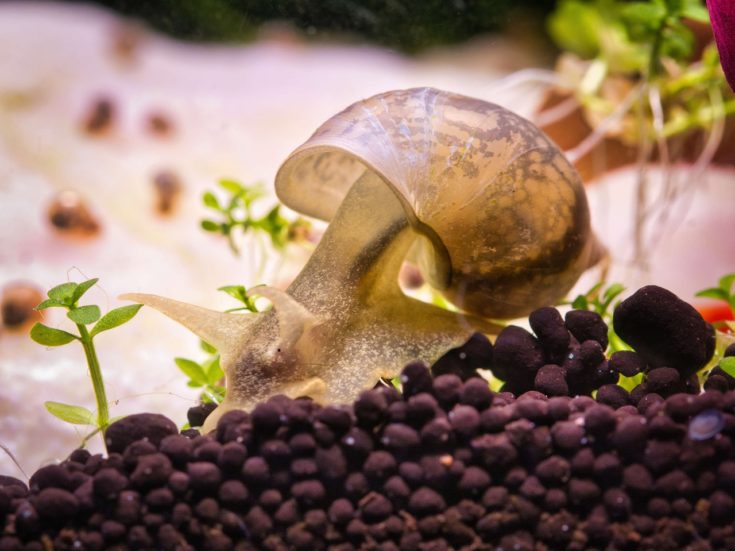
- 1 x Amano shrimp
- 1 x Nerite snail
- 1 x betta fish
- 2 x killifish
Invertebrate Community Tank
One way of avoiding the problem of too many fish in a small tank is to keep snails and shrimp instead. For example:
- 10 x Cherry shrimp
- 5 x Nerite snails
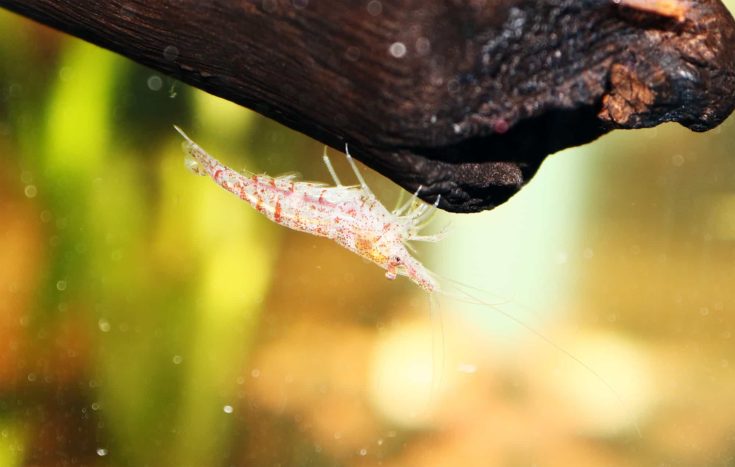
Shrimp are often overlooked, but they do come in myriad colors and species, and they do very well in small, well-planted aquariums.
What Plants For a 5-gallon tank?
Living plants help to keep the water clean by using nitrates as fertilizer and oxygenating the water during photosynthesis. Also, live plants help to create a natural environment for the creatures in the tank, which helps your community feel at home and thrive. And, imaginative aquascaping can make the tiniest tank look stunning.
So, it’s a great idea to add a few nice live plants to a 5-gallon tank. Many aquatic plants are extremely easy to keep, making them ideal for beginner hobbyists.
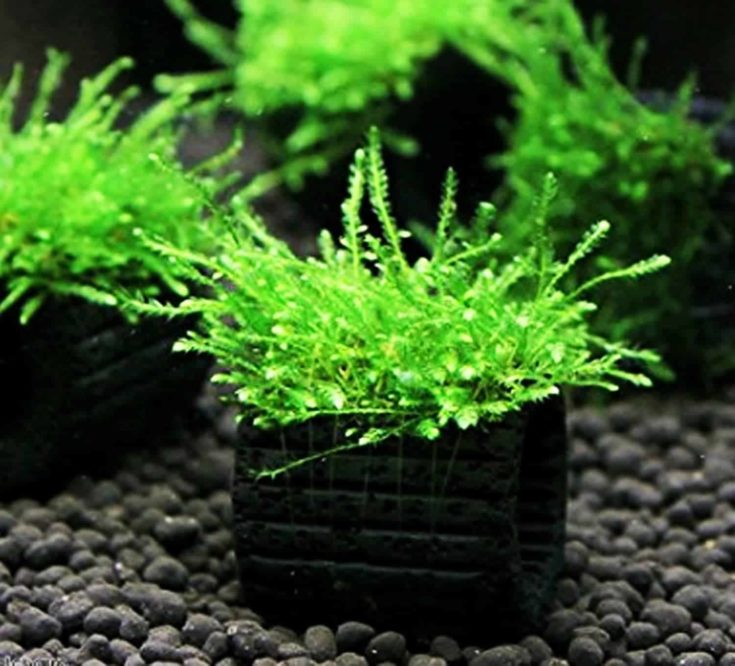
I recommend the following live plants for your 5-gallon aquarium:
- Java Fern
- Java Moss
- Anubias
- Marimo moss balls
17 Best Fish Species for a 5-gallon Tank
Here are 17 fish species that you can keep in a small tank of 5 gallons or larger.
1. Guppy
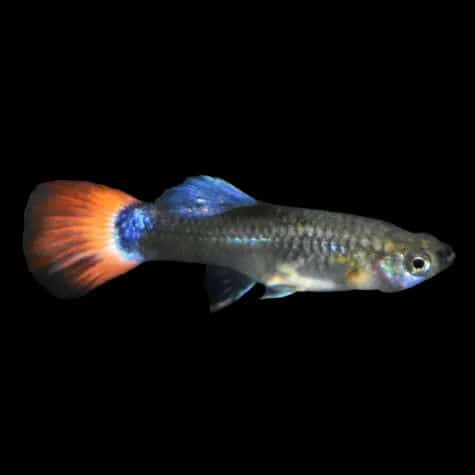
- Family: Poeciliidae
- Care Level: Easy
- Temperament: Peaceful
- Diet: Omnivore
- Water Conditions: Freshwater, tropical
- Max. Size: 0.6 to 2 inches
- Lifespan: Up to 2 years
Guppies come from the tropical waters of South America, and they have long been a perennial favorite in many home aquariums.
These lively little fishes are easy to care for and come in an unlimited range of colors, too. Guppies breed incredibly easily, too. So, stick to buying males only so that your small tank doesn’t get overrun!
2. Betta Fish (Betta splendens)
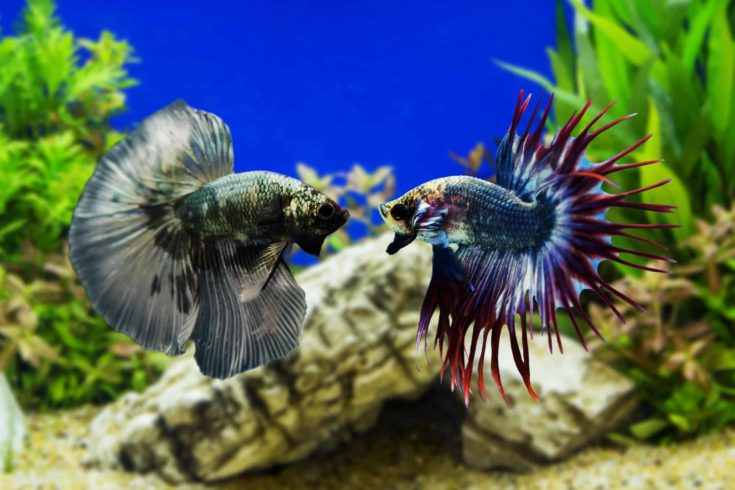
- Care Level: Intermediate
- Temperament: Semi-aggressive
- Diet: Omnivore
- Water Conditions: Freshwater, tropical
- Max. Size: 2 to 4 inches
- Lifespan: 6 to 7 years
Betta fish are also known as Siamese Fighting fish. These feisty fishes are beautiful but highly territorial, and males will fight, sometimes to the death.
Keep one male betta with a couple of Cherry shrimp, and your tank will have a gorgeous pop of color!
3. Mollies (Poecilia sphenops)
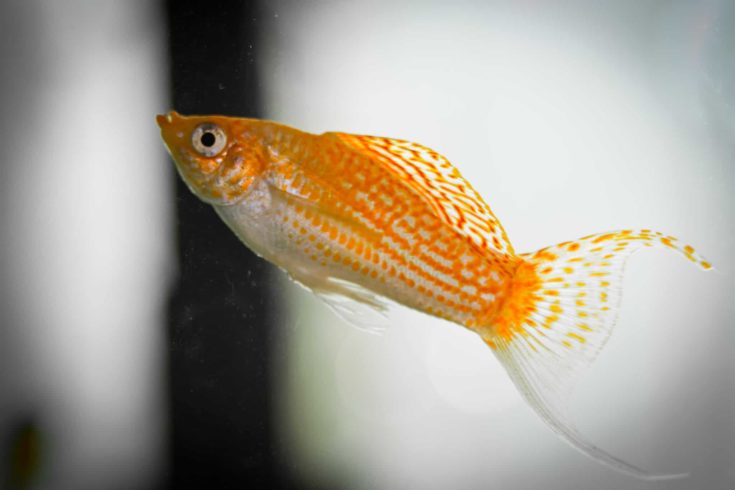
- Care Level: Easy
- Temperament: Peaceful
- Diet: Omnivore
- Water Conditions: Freshwater, tropical
- Max. Size: 3 to 4 inches
- Lifespan: 3 years
The ever-popular Molly is the perfect fish for a beginner. These brightly colored, lively little fish come in several forms, including Balloon and Sailfin Mollies, as well as Common Mollies.
Mollie are peaceful fish that give birth to live young, frequently! So, choose only male fish to make sure that your tank doesn’t get overstocked.
4. Neon Tetras (Paracheirodon innesi)
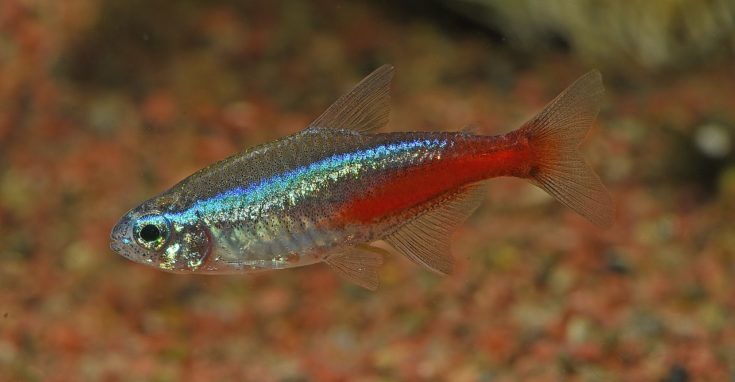
- Care Level: Easy
- Temperament: Peaceful
- Diet: Omnivore
- Water Conditions: Freshwater, tropical
- Max. Size: 1.6 inches
- Lifespan: 2 to 3 years
Neon tetras give you plenty of bang for your buck if you want a brightly colored, lively display for your aquarium.
Although they are easy to care for, Neon tetras are shoaling fish. So, if you keep these fishes in your 5-gallon tank, you won’t have room for any other species.
5. Harlequin Rasboras (Trigonostigma heteromorpha)
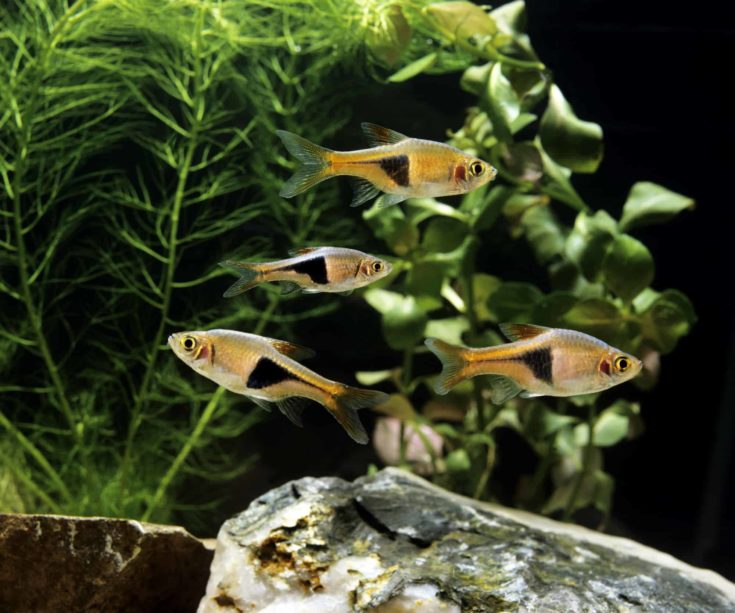
- Care Level: Intermediate
- Temperament: Peaceful
- Diet: Omnivore
- Water Conditions: Freshwater, tropical
- Max. Size: 2 inches
- Lifespan: 2 to 3 years
Harlequin Rasboras are boisterous, brilliantly colored shoaling fish that can be good to keep in a well-planted 5-gallon tank, provided that you keep a few of them together.
These delightful little fishes can be rosy red, golden, or copper-colored and look especially beautiful when set off by a dark substrate.
6. White Cloud Mountain Minnow (Trigonostigma heteromorpha)
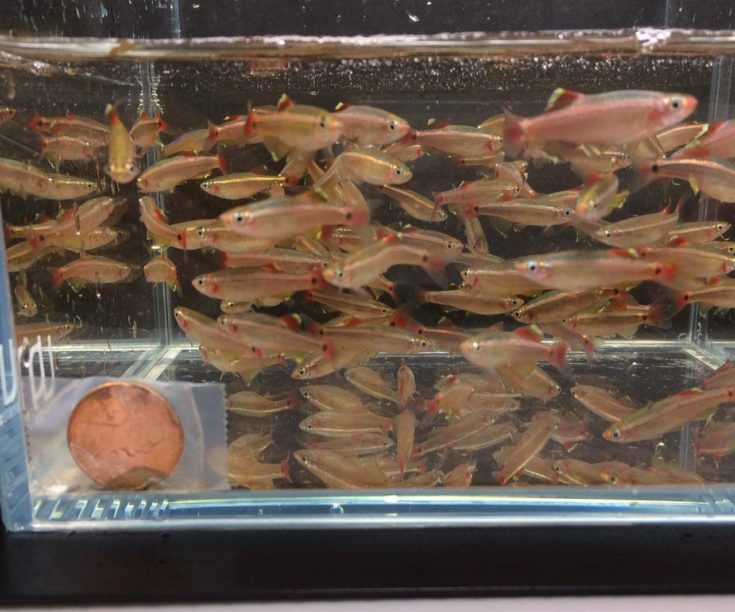
- Care Level: Beginner
- Temperament: Peaceful
- Diet: Omnivore
- Water Conditions: Freshwater, temperate
- Max. Size: 1.5 inches
- Lifespan: 3 to 5 years
The White Cloud Mountain Minnow is a peaceful shoaling fish that must be kept in a group of its own kind to be happy and do well.
These fish prefer cooler water temperatures around 60o Fahrenheit, making them unsuitable for life in a tropical tank.
7. Honey Gourami (Trichogaster chuna)
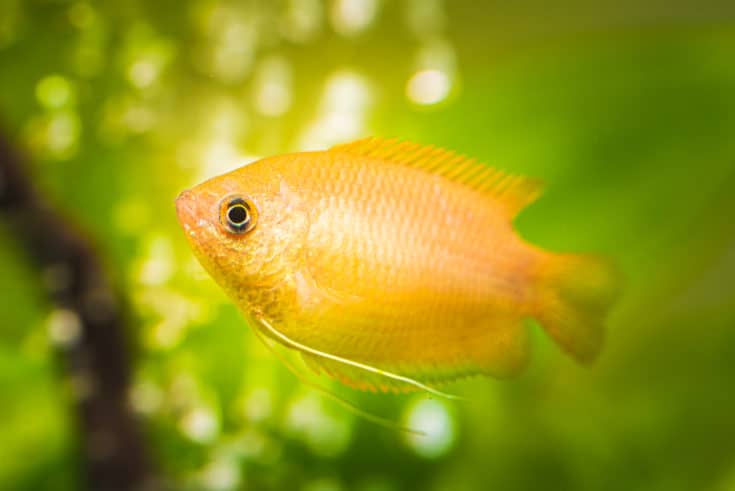
- Care Level: Beginner
- Temperament: Peaceful
- Diet: Omnivore
- Water Conditions: Freshwater, temperate
- Max. Size: 2 inches
- Lifespan: 4 to 6 years
The Honey gourami is closely related to the Dwarf gourami. These beautiful fish can look rather bland and silvery in color until acclimated to their new tank. However, once the fish are settled and happy, their true, golden honey color emerges.
Gouramis are peaceful community fish that can also be kept in pairs.
8. Least Killifish (Heterandria Formosa)
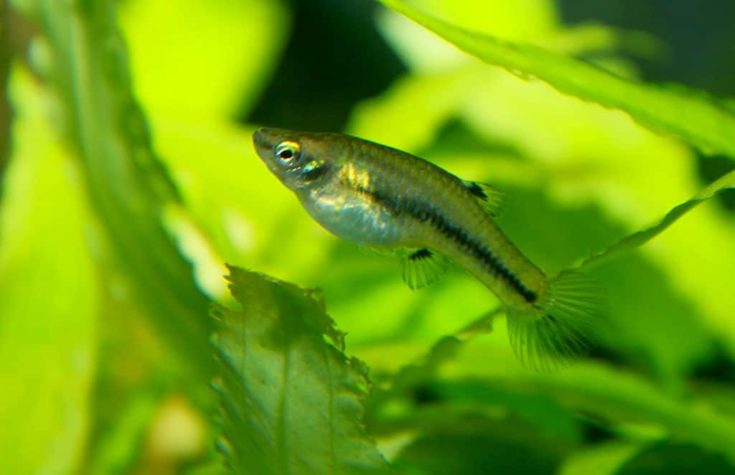
- Care Level: Beginner
- Temperament: Peaceful
- Diet: Omnivore
- Water Conditions: Freshwater, tropical
- Max. Size: 1 to 1.4 inches
- Lifespan: 3 to 4 years
Least Killifish are a shoaling species that do best when kept in groups of at least four individuals. These tiny fish prefer a well-planted aquarium with plenty of hiding places.
You don’t often see these lovely little fish in aquarium stores, but you can buy them from online suppliers for a relatively low cost.
9. Celestial Pearl Danios (Danio margaritatus)
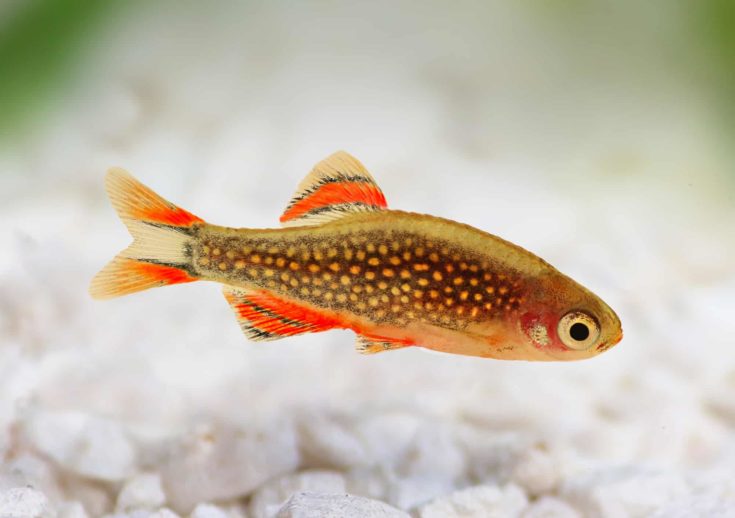
- Care Level: Intermediate
- Temperament: Peaceful
- Diet: Omnivore
- Water Conditions: Freshwater, tropical
- Max. Size: 1 inch
- Lifespan: 3 to 5 years
With their stunning looks and curious, lively habit, the Celestial Pearl Danio makes a great addition to the small tank.
These peaceful community fish do best when kept in a small group of their own kind, spending much of their time exploring the lower reaches of the tank.
10. Endler’s Livebearers (Poecilia wingei)
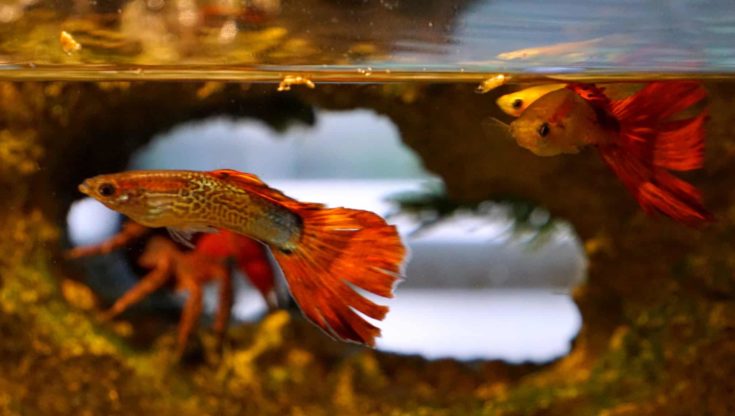
- Care Level: Easy
- Temperament: Peaceful
- Diet: Omnivore
- Water Conditions: Freshwater, tropical
- Max. Size: 1 inch
- Lifespan: 3 to 5 years
Endler’s Livebearers are beautiful swimming jewels that bring a gorgeous pop of shimmering color to any tank. These are peaceful shoaling fish that get along well with all other small community species.
You do need to keep these guys in a group, and although they can be kept in a 5-gallon aquarium, Endler’s do prefer a larger tank with plenty of swimming space and dense planting.
11. Clown Killifish (Aplocheilus Annulatus)
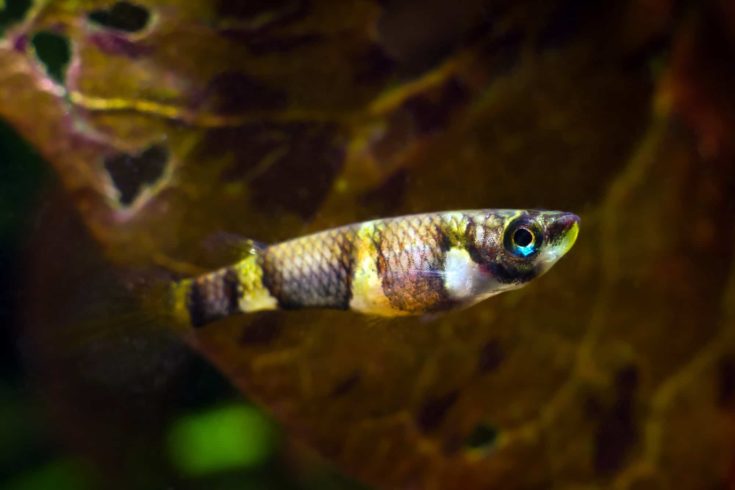
- Care Level: Easy
- Temperament: Peaceful
- Diet: Omnivore
- Water Conditions: Freshwater, tropical
- Max. Size: 1 inch
- Lifespan: 3 to 5 years
The Clown Killifish is an extremely attractive little fish that can be kept in a 5-gallon tank. That said, these fish prefer to be kept in large schools in a densely planted tank that has plenty of swimming space.
These killifish need well-filtered water and are highly sensitive to poor water conditions, so an efficient filtration system and high circulation rate are essential.
12. Dwarf Puffer (Carinotetraodon travancoricus)
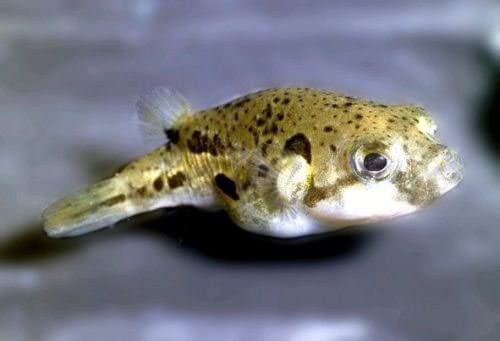
- Care Level: Intermediate
- Temperament: Aggressive
- Diet: Carnivore
- Water Conditions: Freshwater to brackish, tropical
- Max. Size: 1 inch
- Lifespan: up to 10 years
Dwarf puffers or Pea puffers are pea-sized little creatures that are intelligent, active fish that make a great addition to a small tank.
The Dwarf puffer swims in a unique pattern, making the fish fascinating to watch. These strange nano fish are undoubtedly cute, and although a little shy at first, will quickly come to recognize you as they watch what’s going on outside the tank.
13. Rosy Loach (Tuberoschistura arakanensis)
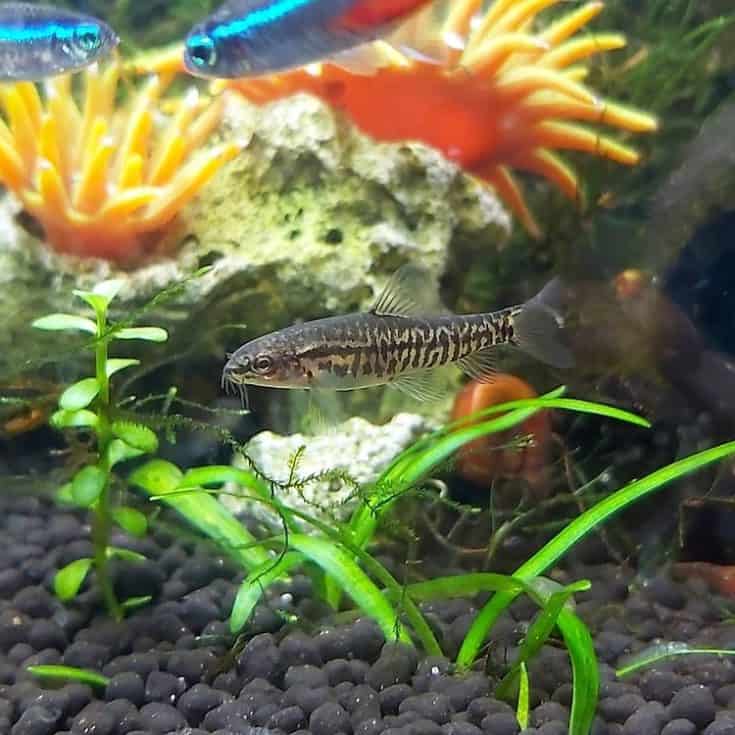
- Care Level: Easy
- Temperament: Peaceful
- Diet: Omnivore
- Water Conditions: Freshwater tropical
- Max. Size: 1 inch
- Lifespan: 3 to 5 years
Rosy loaches are pretty, highly sociable little fishes that can be kept in a small tank, provided that you keep them in a group.
These fish need gentle water movement, plenty of shady hiding places, and dense planting. Rosy loaches have delicate sensory barbels, so the substrate must be soft and sandy.
14. Nerite Snail (Neritidae)

- Care Level: Easy
- Temperament: Peaceful
- Diet: Omnivore
- Water Conditions: Freshwater tropical
- Max. Size: 1 inch
- Lifespan: 2 years
Nerite snails come in many varieties and colors, making them an attractive addition to your tank. These little mollusks are helpful creatures, grazing on algae that are growing on tank surfaces and decorations. The snails can also make a meal out of decomposing plant matter, helping to keep the tank clean.
Nerites are peaceful, fitting in well with fish and other invertebrates.
15. Cherry Shrimp (Neocaridina davidi)
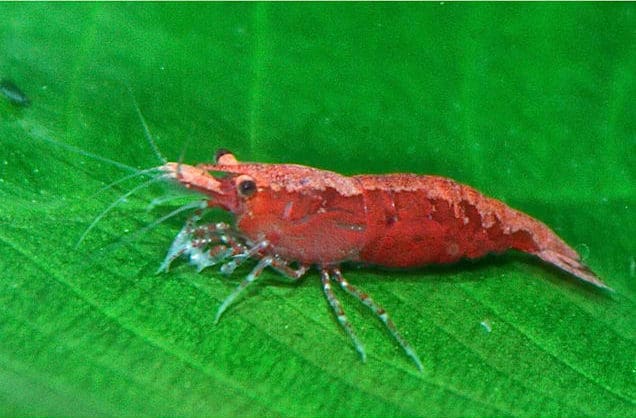
- Care Level: Easy
- Temperament: Peaceful
- Diet: Omnivore
- Water Conditions: Freshwater tropical
- Max. Size: 1.5 inch
- Lifespan: 1 to 2 years
Cherry shrimp are native to Taiwan and are just about the most popular shrimp in the hobby. Although Cherry shrimp are basically red, they do come in a variety of shades and are actually graded, depending on the depth of coloration.
These hardy creatures graze on algae within the tank, helping to keep the glass and décor clean. The shrimp thrive in densely planted aquariums that offer plenty of hiding places and sheltered spots.
16. Dwarf Crayfish (Cambarellus)
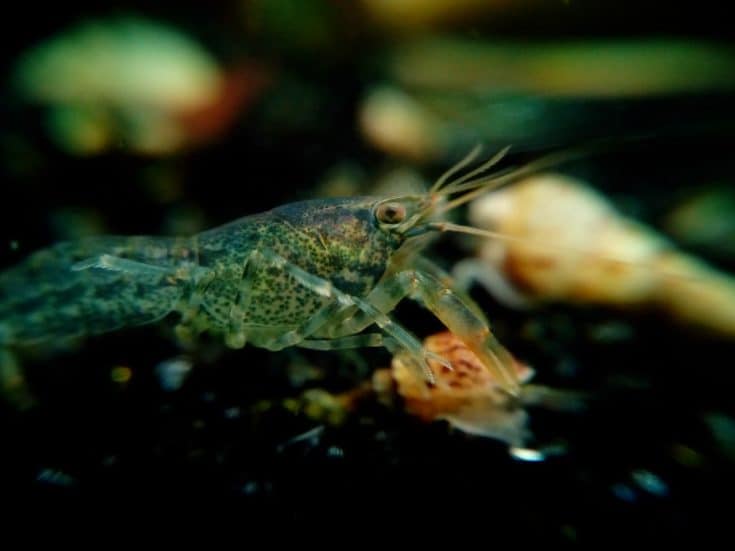
- Care Level: Easy
- Temperament: Peaceful
- Diet: Omnivore
- Water Conditions: Freshwater tropical
- Max. Size: 1.6 to 2 inches
- Lifespan: 1 to 3 years
Dwarf crayfish make an interesting addition to a small tank. These industrious little creatures spend most of their time exploring the bottom of the aquarium, scavenging for scraps of dropped food.
Crayfish need a well-filtered environment with dense planting and plenty of places where they can hide.
17. Amano Shrimp (Caridina multidentate)

- Care Level: Easy
- Temperament: Peaceful
- Diet: Omnivore
- Water Conditions: Freshwater tropical
- Max. Size: 2 inches
- Lifespan: 2 to 3 years
Amano shrimp have a fearsome reputation as prolific algae eaters and scavengers, making them a popular addition to the tropical tank. Amanos are very hardy creatures, too, making them the ideal choice for a beginner. Also, this shrimp can be safely kept with nano fish and other invertebrates.
Amano shrimp need a heavily planted tank that offers plenty of hiding places.
Fish Species That are NOT Suitable for a 5-gallon Aquarium
There are a few fish species that are a definite no-no for a 5-gallon setup:
1. Goldfish (Carassius auratus)
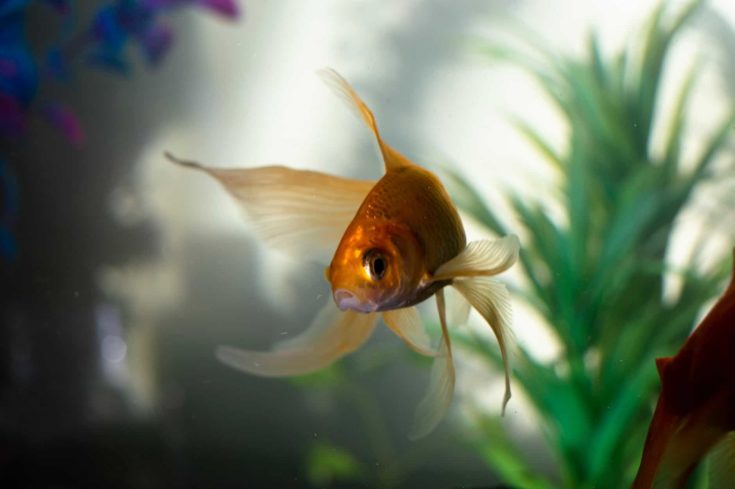
Goldfish are popular pets for kids and often end up in very small tanks. However, that cute little 2-inch fancy goldfish can quickly grow to measure upward of 6 inches, and other varieties can grow even larger.
Goldfish are highly social animals, and life alone is extremely stressful for them.
So, goldfish are not suitable for life in a small tank. Period.
2. Angelfish (Pterophyllum)
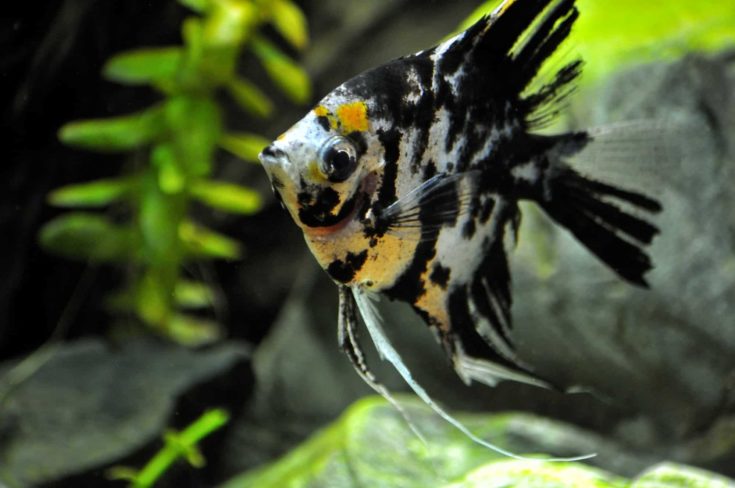
Angelfish are elegant tropical fish that start life as 1.5-inch babies. The Angelfish’s attractive colors and graceful movement capture the hearts of many beginner aquarists. However, these beauties are not suitable for a small tank.
At maturity, Angelfish can grow up to at least 6 inches in height. Also, Angelfish are cichlids, and they can be aggressive toward smaller fish.
3. Cichlids
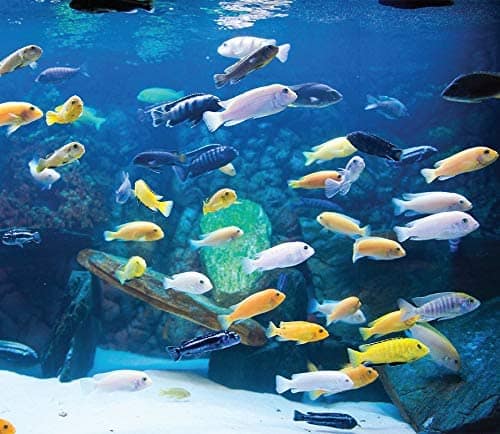
There are over 1,300 species of cichlids, including a few small ones. However, cichlids are typically territorial, and they can be aggressive, eating smaller fish and invertebrates.
Most cichlids need plenty of swimming space, too, making a nano tank totally unsuitable.
What to Consider When Stocking a 5-gallon Tank
As well as what fish species you can keep, there are a few other things that you need to consider when stocking a 5-gallon tank.
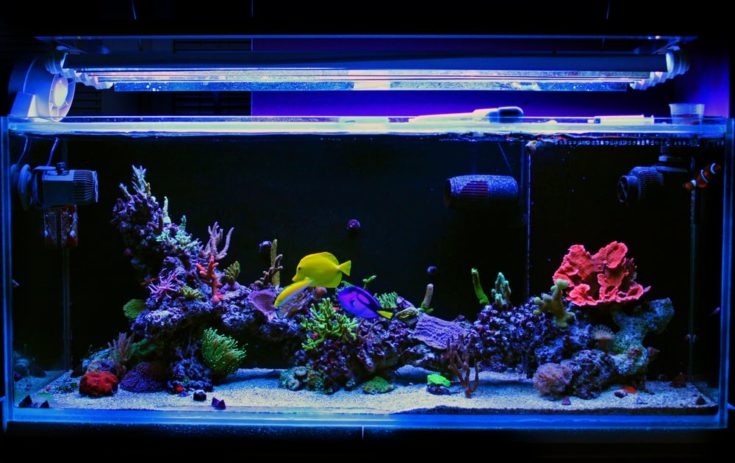
A small aquarium is very appealing as the first tank for newbies to the hobby. Many small tanks are attractively designed, will fit neatly onto a counter or desktop, and they’re often much cheaper to buy than larger alternatives.
That said, a nano tank (generally defined as a freshwater aquarium with a capacity of less than 10 gallons) does greatly limit your options. That’s because only a few fish species will thrive and do well in a very small tank. And I do emphasize the word thrive here. There are undoubtedly quite a few species of fish that can survive in a nano tank, but very few will be happy and healthy in a setup that small.
Filtration and Heater
No matter what size tank you choose, you must set it up with a filter system. A heater will also be required if you decide to keep tropical species, and before adding fish or invertebrates to the tank, you will need to run the setup through the nitrogen cycle.
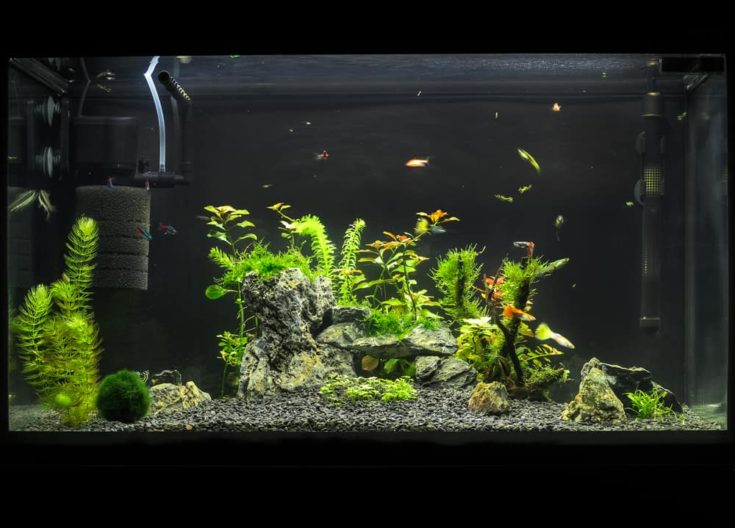
All living creatures produce waste. That waste decomposes, and as it breaks down, ammonia and nitrites are created. Both those substances are highly toxic to aquarium fish.
A filtration system works by circulating the water around the tank, passing the toxin-laden water through sponges or other types of filter media. The mechanical filter media removes large particles of waste from the water, and the bacteria contained in the biological filter media process and neutralize the toxins, keeping the water safe for your fish.
Size and Behavior of the Fish
Popular aquarium fish species vary considerably in their size and behavioral traits, which must be taken into consideration when choosing fish for a small tank.
Fish grow quickly!
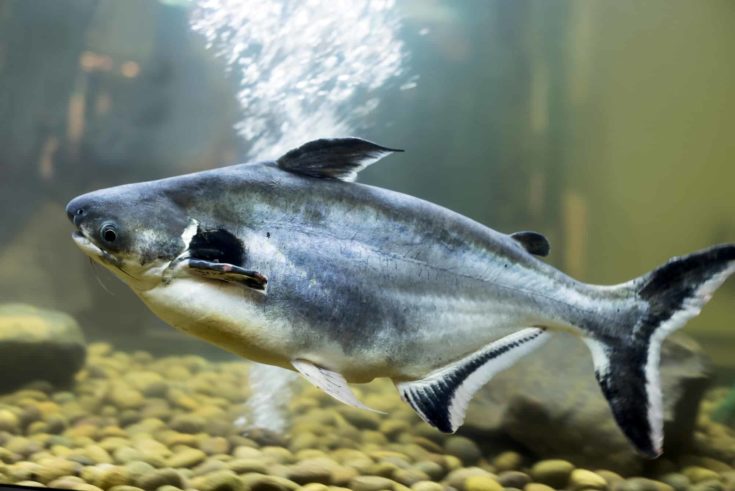
Most of the fish that are sold in fish stores and pet shops are juveniles. So, that cute little one-inch long fishy that looks so appealing will undoubtedly grow, often very quickly, into an adult that could measure a whopping 8 inches!
Safety in numbers?
Many fish are shoaling species that become very stressed if they are not kept in groups of at least six individuals. Tiny species are especially vulnerable to stress if kept alone or in couples. In nature, a large shoal of nano fish feels like a much safer place to be than on your own or with just one companion, and it’s the same in the captive environment.
On the other hand, some fish can be aggressive and are happiest when kept alone, making them more suited to a solo life in a small tank than as members of a community.
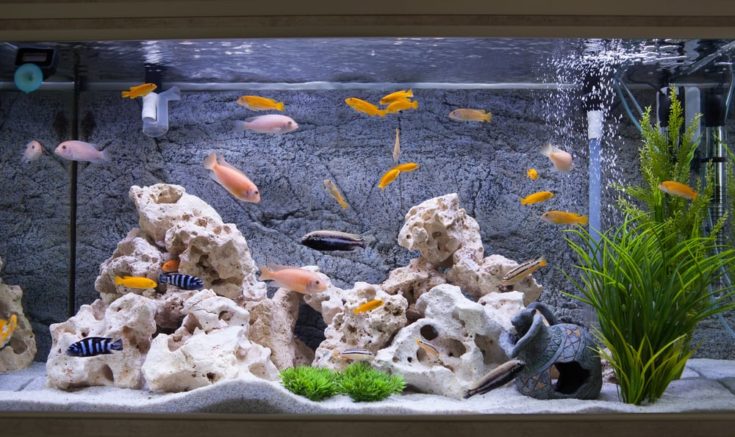
Some fish are extremely active and need plenty of space in which to swim. For these species, a nano tank won’t be suitable.
Bottom line: Research the fish you’re considering before you buy them to make sure that their size and behavior suits a 5-gallon tank.
Tank Shape
When stocking any tank, the shape of the aquarium is an important consideration. Square tanks, cube-shapes, and tall hexagonal aquariums are much more difficult to stock and decorate than long, rectangular ones.
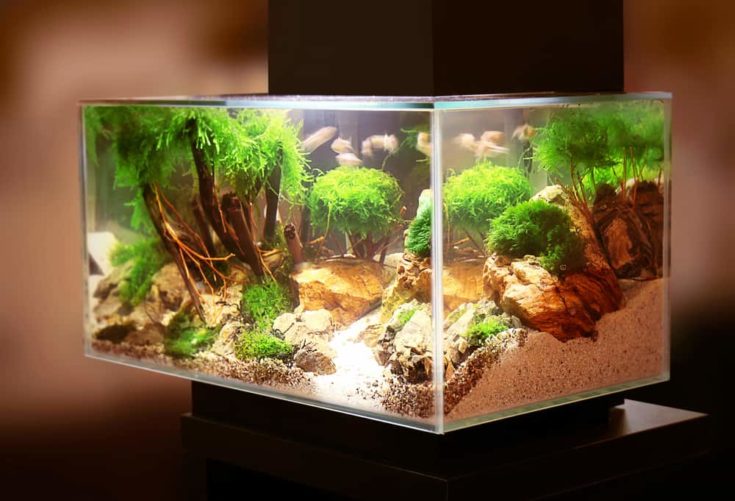
Fish Bowls and vases are not recommended for keeping fish. Both styles of containers have very limited space and water surface area, meaning that the levels of dissolved oxygen in the water are typically low. That’s bad news for anything living in the bowl. Also, it’s extremely difficult to filter a bowl properly, leading to poor water quality and a high fish mortality rate.
So, I recommend that you choose a rectangular tank if you have your heart set on a very small aquarium.
How Many Fish Can You Put in a 5-gallon tank?
The general rule of thumb for stocking any fish tank is one inch of fish per one gallon of water in the aquarium.

However, you clearly can’t put a 6-inch fish in a tiny 5-gallon tank. And, as mentioned above, you need to consider factors such as how much swimming space there is in the tank and the water quality. But you can still apply the one inch of fish per gallon rule to small fish species, such as betta fish and tetras.
The best policy is to add fish gradually and test the water parameters daily to make sure that the water is clean and sanitary for your fish.
Conclusion
I hope you enjoyed our suggestions for the best fish to keep in a 5-gallon tank. Although there are quite a few nano fish that can live in a very small tank, you might want to consider keeping shrimp and snails instead. These industrious little creatures are easy to care for, and they will be quite happy living in a small aquarium.
Do you have a nano tank? If you do, we’d love to hear about it!
Tell us about your aquarium in the comments box below, and if you loved this article, be sure to share it!
You might be interested in our article about best fish for a 20-gallon tank. Read about it here.
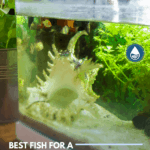
Really enjoyed this information. Thanks
Amazing information!, i really enjoyed reading this and it was very helpful 🙂
Looking for a Nano tank, and came upon this very interesting article. Thank you so much !
Gave me lots of ideas.